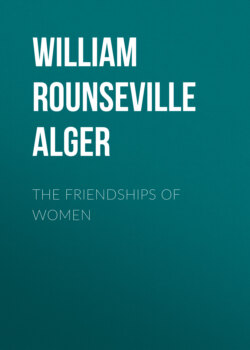Читать книгу The Friendships of Women - William Rounseville Alger - Страница 15
На сайте Литреса книга снята с продажи.
FRIENDSHIP WITHIN AND WITHOUT THE TIES OF CONSANGUINITY.
ОглавлениеTHE presentation of the friendships of women in distinct classes will add clearness to the treatment, and will also make it easier to suggest, with some approach to adequacy, the wealth of the topic. It is natural to begin with instances within the limits of blood relationship, and between persons of opposite sex. The relations of conscious affection among those of near kindred are but too apt, from the blunting influence of custom, to have a character of tameness, lukewarm routine. The members of the family, in their commonplace familiarity, cherish a quiet goodwill and fidelity, without any relishing surprise, romantic hues, or mystery. Calmly affectionate, or perhaps listless, towards all within the domestic circle, they look outside for inspiring intercourse and thrilling attachments, and for calls to lofty sacrifice and delight. This is too often the case. Identity of inheritance and situation, sameness of idiosyncrasy, and habitude of union, squeeze poppies into the household cup, and clothe in dull gray the familiar landscape around; and yet, happily, in numerous instances it is not so. The confidential intimacies, the incessant dependencies, duties, and favors of near relatives, instead of engendering a consciousness of vapid usage, sprinkle electric stimulants on their mutual feelings and intercommunications.
Their affictions towards each other keep fresh and grow deeper, and the homestead stands in a landscape tinged with faith and romance. The imagination, undeadened by custom, goes with their eyes and hands, exerts its beautifying magic, and idealizes or glorifies their images in each other's souls.
Then kinship becomes friendship. Upon the material consanguinity is superinduced a spiritual consanguinity; the legal and customary bonds of descent, association, and duty are brightened and exalted into delightful relations of intelligence and sympathy, a choice community of character, purposes, and experience. The relative is then hidden in the friend. Innumerable aunts and nephews, nieces and uncles, cousins, and other branches of kindred, have found in their relationship, with the common interests and the consequent meetings, a fortunate occasion for forming close and blessed friendships.
The biblical instance of Esther and Mordecai is very charming. Esther, left an orphan, was adopted and brought up by her uncle, Mordeoi. When the beautiful Jewish maiden was taken into the palace, among those from whom Ahasuerus was to choose his queen, "Mordecai walked every day before the court of the women's house, to know how Esther did and what should become of her." And when she had been made queen, "she did still the commandment of Mordecai, like as when she was brought up with him." In the threatened calamity of the Jews, Mordecai rent his clothes, and put on sackcloth with ashes, and wept. Esther's maids told her of it. "Then was the queen exceedingly grieved; and she sent raiment to clothe Mordecai." In all the sequel of the well-known tale, it is easy to see that the niece's friendship for her uncle was at least as important a sentiment as the wife's love for her husband. Beranger caused to be placed on the tomb of his aunt this touching inscription: She was never a mother, yet sons mourned for her. It is a striking fact that the strength of the tie of blood is in an historic process of decrease, while, parallel with it, the strength of the tie of moral sympathy is in an historic process of increase. In primitive ages, when barbaric force prevailed, and life was full of exposures, and redress was uncertain, the family was the unit of society. All within the bond of the family stood compactly together in the most sacred and intense of leagues against every hostile approach from without. But as law and order became consolidated, and their sanctions diffused, and adequate general tribunals were set up, and public considerations encroached on private, the tie of physical kindred grew less, that of moral fellowship more. The bloody feuds of old times, which ran down the veins of successive generations like streams of fire, have become nearly obsolete. The hates transmitted with such wild ferocity, the friendships handed down with such burning loyalty, among the ancient Scottish clans, are phenomena not possible in the cultured circles of Berlin, London, Paris, or New York. This relative decay of the energy of the sentiment of material relationship is not to be regretted; for it is a sign of progress, when we see its connection with the corresponding development of the force of free spiritual affinity. It looks towards the end contemplated by Jesus when he said. "Whosoever doeth the will of my Father in heaven, the same is my mother, and my brother, and my sister."
Once the merit or demerit of the individual had comparatively little to do with the regards which the other members of the family cherished towards him. Now it goes far towards a total determination of those regards. Multitudes of the nearest relatives are utterly indifferent to each other; multitudes of them hate each other. Where no fitness for a genuine union of mind and heart exists in the parties, all the forensic ties and all the conjoining memories in the world go for nothing. A horrid illustration of this truth is given by the conduct of Tullia, the Lady Macbeth of antiquity, who drove her chariot over the body of her murdered father lying in the "Wicked Street," and smiled as his blood spattered her dress. But truly it is a happy thing when those naturally associated in birth, position, and circumstances of life, become by sympathy inwardly united in mutual appreciation and will. It is like adding the spirit of music to the material conditions of music.
